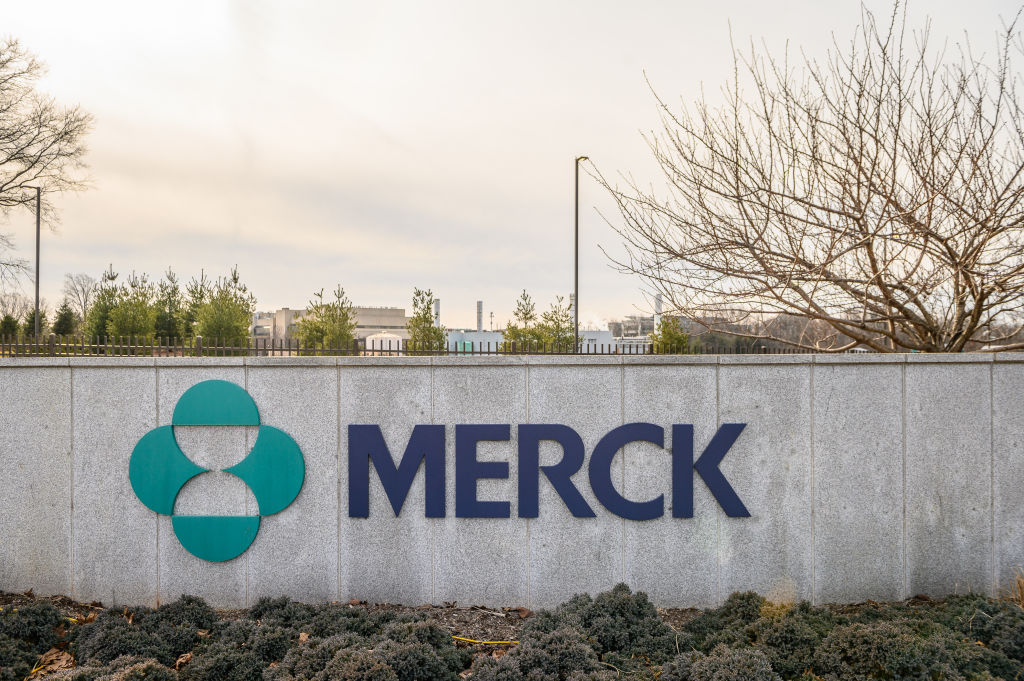
A Merck drug developed to prevent disease from respiratory syncytial virus (RSV) in infants has won FDA approval, introducing competition to products already available from Pfizer and Sanofi.
The Monday regulatory decision for the antibody, known in development as clesrovimab, covers its use in newborns and infants entering their first RSV season, which spans the fall and winter months. For those born during RSV season, clesrovimab is to be administered soon after birth. Merck will market its new product under the brand name Enflonsia.
RSV infection typically leads to symptoms resembling the common cold in healthy people. But in babies and older adults, the disease caused by RSV infection can lead to life-threatening breathing complications. For nearly three decades, the only FDA-approved product for protecting babies from the lower respiratory tract disease caused by RSV was Synagis, an antibody developed and commercialized by AstraZeneca. That product’s approval covered its use only in premature babies. This antibody has a short half-life that requires monthly dosing. More recent advances in RSV research has led to products, such as Merck’s Enflonsia, that require just a single injection.
Enflonsia is an antibody designed to last in the body for about five months, which is long enough to protect an infant through a typical RSV season. The FDA decision for the product is based on results from a placebo-controlled Phase 2b/3 clinical trial that enrolled 2,858 infants entering their first RSV season. Results showed a 60.5% reduction in the incidence of RSV-associated infections compared to placebo through five months. The antibody also led to a reduction in RSV-associated hospitalizations through five months. The most common adverse effect was injection site reactions. In a Phase 3 test that compared Enflonsia to Synagis, the safety of the Merck drug was comparable to the AstraZeneca product.
Pfizer’s presence in RSV is through Abrysvo, a vaccine comprised of an engineered version of RSV F protein antigen. It was first approved for use in older adults in 2023. Later that year, the vaccine was approved for maternal immunization, in which immunization of a pregnant mother leads to the production of antibodies that are passed on to the baby. Last year, the FDA expanded the Abrysvo’s label to include adults age 18 to 59. Pfizer reported $755 million in Abrysvo revenue in 2024 across all of its approved uses, down 15.1% from the prior year. The company attributed the decline to a significant reduction in U.S. vaccination rates for older adults, partly offset by strong demand for use of the product for maternal immunization.
Sanofi’s Beyfortus, approved in 2023, has become the dominant product for infant protection from RSV. Similar to Merck’s new RSV product, Beyfortus is a long-acting antibody that while technically a drug, is intended to protect like a vaccine. The antibody is designed with technology giving it a half-life that lasts about five months. Sanofi R&D executive Jon Heinrichs told Medcity News in 2023 that Beyfortus’s advantage over maternal immunization is that administration can be timed to offer the greatest protection during RSV season. By contrast, the timing of a birth can only be estimated, so antibodies produced from maternal immunization may no longer be effective by the time RSV season arrives or may wane during the season.
Beyfortus is administered as a single intramuscular injection. Sanofi reported $1.6 billion in revenue for the product in 2024, more than double its sales in the prior year. Unlike Beyfortus, whose dosing depends on a patient’s weight, Merck’s Enflonsia is given as the same 105 mg dose regardless of patient weight. In a prepared statement, Dean Li, president of Merck Research Laboratories, said the company is committed to making Enflonsia available before the start of the upcoming RSV season.
Recommendations for vaccine use comes from the Centers for Disease Control and Prevention’s Advisory Committee on Immunization Practices (ACIP). This committee is scheduled to convene June 25 to 27. Merck said that it expects ACIP will discuss Enflonsia at this meeting.
When the ACIP meeting happens, it will have an entirely new roster. The Department of Health and Human Servies on Monday announced that the committee’s 17 sitting members have been removed. HHS said 13 of those members were appointed in 2024 under President Biden. All members will be replaced by new members currently under consideration. HHS Secretary Robert F. Kennedy Jr. said in the announcement that “a clean sweep is necessary to reestablish public confidence in vaccine science.” Kennedy went on to assert, without evidence, that the committee of independent advisors had been functioning “as a rubber stamp for industry profit-taking agendas.”
The American Medical Association took issue with the dismissal of ACIP’s members, stating that the committee has been trusted to provide science- and data-driven advice and guidance.
“Physicians, parents, community leaders and public health officials rely on them for clinical guidance, public health information, and knowledge,” Dr. Bruce Scott, president of the association, said in an emailed statement. “Today’s action to remove the 17 sitting members of ACIP undermines that trust and upends a transparent process that has saved countless lives. With an ongoing measles outbreak and routine child vaccination rates declining, this move will further fuel the spread of vaccine-preventable illnesses.”
[The following two paragraphs added with analyst comment.] Leerink Partners analyst Daina Graybosch said the firing of ACIP’s members increases risk to all vaccine manufacturers. The CDC typically adopts ACIP recommendations and under the Affordable Care Act, payers must cover ACIP-recommended vaccines without restriction or cost sharing. At best, the new committee members will need time to get up to speed, potentially delaying recommendations for less controversial products, such as Merck’s Enflonsia, she said in a note sent to investors. At worst, the committee could upend current recommendations for existing vaccines. While the composition of the new committee is still to be determined, Graybosch said new members will likely be sympathetic to at least some of Kennedy’s vaccine beliefs, such as the disproven link to autism.
“Since today’s statement criticizes that the committee ‘has never recommended against a vaccine,’ it suggests that ACIP could be more critical of vaccines, which could negatively impact approved vaccine recommendations and increase the burden of evidence and costs for future vaccine development,” Graybosch said, referencing a comment Kennedy made in an opinion piece published online Monday in the Wall Street Journal.
Photo: Christopher Occhicone/Bloomberg, via Getty Images






